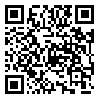Sat, Jul 27, 2024
[Archive]
Volume 16, Issue 1 (2-2024)
itrc 2024, 16(1): 1-10 |
Back to browse issues page
Download citation:
BibTeX | RIS | EndNote | Medlars | ProCite | Reference Manager | RefWorks
Send citation to:



BibTeX | RIS | EndNote | Medlars | ProCite | Reference Manager | RefWorks
Send citation to:
Moradi A, Mohamed-pour K, Jafari Farsani N. A Dynamic Hybrid Precoding Structure for mmWave Massive MIMO Systems. itrc 2024; 16 (1) :1-10
URL: http://ijict.itrc.ac.ir/article-1-537-en.html
URL: http://ijict.itrc.ac.ir/article-1-537-en.html
1- Department of Electrical Engineering K. N. Toosi University of Technology Tehran, Iran
2- Department of Electrical Engineering K. N. Toosi University of Technology Tehran, Iran ,kmpour@kntu.ac.ir
2- Department of Electrical Engineering K. N. Toosi University of Technology Tehran, Iran ,
Abstract: (783 Views)
Due to the high-power consumption and complexity of fully digital baseband precoding, its implementation in massive millimeter-wave multiple-input multiple-output (MIMO) systems is not cost-efficient and practical; for this reason, hybrid precoding has attracted a lot of attention in recent years. Most hybrid precoding techniques concentrate on the fully-connected structure, although they require lots of phase shifters, which is high energy-consuming. On the contrary, the partially-connected structure has low power consumption, nevertheless, suffers from a severe decrease in spectral efficiency (SE). To enhance SE, this paper proposed a dynamic hybrid precoding structure where a switch network is able to provide dynamic connections from phase shifters to radio frequency (RF) chains. To determine the digital precoder and the states of switch, a novel alternating minimization algorithm is proposed, which leverages closed-form solutions at each iteration to efficiently converge to an optimal solution. Furthermore, the phase shifter matrix is optimized through an iterative solution. The simulation results show that in terms of SE, the proposed algorithm with a dynamic structure achieves higher performance than the partial structure. Also, since the proposed structure reduces the number of phase shifters, it can guarantee better energy efficiency (EE) than the fully connected structure.
Keywords: Massive MIMO, Spectral efficiency, Hybrid precoding, mmWave communication, Energy efficiency
Type of Study: Research |
Subject:
Communication Technology
Send email to the article author
| Rights and permissions | |
 | This work is licensed under a Creative Commons Attribution-NonCommercial 4.0 International License. |




